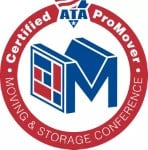Are you in the midst of a move this year or planning one before the tax year concludes? We recommend diligently keeping track of all your moving expenses – it's a step we've seen our clients benefit from time and again.
Unfortunately, your federal tax return might not get much help from the IRS. Federal-level tax breaks for moving expenses were taken away in 2018. They're unlikely to return until 2026. Despite that, we've noticed that certain exceptions persist. Various states offer tax-deductible moving expenses that you might find applicable, and there are specific tax deductions available for members of the armed forces, which we've helped clients navigate in the past.
Curious about whether your moving expenses could be tax-deductible? In our upcoming post, we'll delve into all the essential information you need to know about tax-deductible moving expenses and how you might benefit from them.
What Kinds of Moving Expenses Are Tax-Deductible?
The Tax Cuts and Jobs Act, also known as the TCJA, changed the rules governing which moving expenses are deductible. You might get reimbursement from your employer if you're moving to start a new job. The process becomes a lot more complicated if you are self-employed, which is why consulting a certified tax professional is always your best course of action.
For now, the TCJA only permits claiming particular costs associated with moving, such as:
-
Parking fees
-
Using a moving company
-
Shipping passenger vehicles to your new home
-
Temporary lodging during direct travel to your next home
-
Moving supplies
-
30 consecutive days of temporary storage
-
Utility disconnection fees for the home you're leaving

Qualifying Rules for Military Members
One thing you should note about the TCJA is that it doesn't impact military personnel who move. If you are in uniform, then you can deduct your moving expenses from a federal tax return based on two conditions:
-
You are on active duty.
-
Your move is a result of a permanent change of station or military order.
The rules for time and distance typically won't apply to active-duty military members. Drawing from our experience, we've found that military personnel often enjoy special considerations, such as the possibility of deducting unreimbursed expenses for relocating their spouse and dependents.
Deductible moving expenses for military officers and enlisted personnel include personal effects, household goods, storage, and certain travel expenses. You might also be able to deduct tolls, gas, and costs for shipping personal property and passenger vehicles. Side trips, food, and meals are unlikely to qualify for deductions. Keep an eye out for Form 3903 – it's a valuable tool that we've seen many military personnel use to accurately track potential deductions when filing their tax returns.
Qualifying Rules for State Tax Deductions
After you and your tax professional make sure you've met the requirements surrounding time and distance, there might be income tax breaks you can deduct on your state return. These apply to states that decided not to participate in the federal changes. We have clients who used them on their state income tax returns for New York, Arkansas, New Jersey, California, Pennsylvania, Massachusetts, or Hawaii.
We've recently assisted a client in moving to a new job location, and they were able to reduce their taxable income with "reasonable expenses". Many of these overlap with federal exceptions. Your tax software might help you get a tax credit from your gross income for the following expenses:
-
Packing supplies
-
Shipping costs
-
Including a secondary pickup location
-
30 days of temporary storage between homes
-
Costs associated with shipping pets to a new residence
-
Connection and disconnection costs for utilities at both homes
-
Lodging and transportation expenses during the actual move for your family
Remember that tax laws prevent you from taking double deductions by claiming items on that list as both business and moving expenses simultaneously. You can also deduct expenses associated with breaking a lease, buying a home, or selling one.
Time and Distance Tests
Is a new job the reason for your move to a new home? If so, there are both time tests and distance tests that determine whether you might get special deductions when you switch homes. While a Certified Public Accountant (CPA) can help you figure out if it's better to use the standard deduction or itemize your deductions, we've seen three general rules that can be quite handy:
-
The commute from the previous home you are leaving to the new job was more than 50 miles longer than your prior commute.
-
The timing of your move was within 12 months of starting the new job.
-
You've been employed full-time at the new location for more than 38 weeks within the first 12 months after moving.
Certain Tips for Deducting Moving Expenses
When it comes to deducting moving expenses, there are three general rules that you should follow. They're pretty much the same rules that apply to any category of tax deductions: Document everything, consult a tax professional, and be completely honest when dealing with the IRS.
Documenting everything sounds tedious, but it's also crucial. Anytime you get a receipt for something, whether it's for buying packing supplies or a credit card charge from your moving company, do it. You might not know the standard mileage rate, but you'll never be able to take advantage of it unless you track and note your distance when going down the highway.
Find a tax service or professional who can turn all your documentation into deductions. They will know which ones you qualify for, they might find ones you don't even know about, and they'll make sure you get everything you're entitled to. You already went through the stress of moving, so why not let someone else shoulder the stresses involved with doing taxes?
Don't bend the rules by trying for deductions that don't apply or don't exist, and don't fudge the numbers on the ones you qualify for. You want to get your life started in your new home. If you err on your tax return, you'll have to waste time with an amended return. At worst, you'll face an IRS audit and have to deal with back taxes, fees, and interest.

How to Claim the Moving Taxes Deduction
If you want to claim the moving expenses deduction, you should know it's one of the few deductions you get to claim before you even know whether your situation meets the requirements. The time test involves a 12-month period, and many taxpayers aren't able to satisfy that until the year after they move. The IRS lets you claim the moving expense deduction for the calendar year in which you move, however.
Use IRS Form 2901 to report all your relocation expenses. Attach this to the individual tax return you have for the year you physically moved. You'll have to take the deduction back if you don't finish satisfying every requirement when 12 months are up. Then, you'll either include your original deduction on the next tax return as "other income," or you'll amend your original return to calculate what your taxes should have been minus the deduction for moving expenses.
Final Thoughts
From our vast experience, we've noticed that the majority of taxpayers won't be eligible for federal moving expense deductions until 2026, regardless of whether they submit an amended return. After that, expense reimbursements and travel expenses are likely to return to help people with their moving costs from their former home to their new home. Fortunately, there are still some tax-deductible moving expenses. The more money you save from moving, the more money you have to enjoy starting life in your new location.









